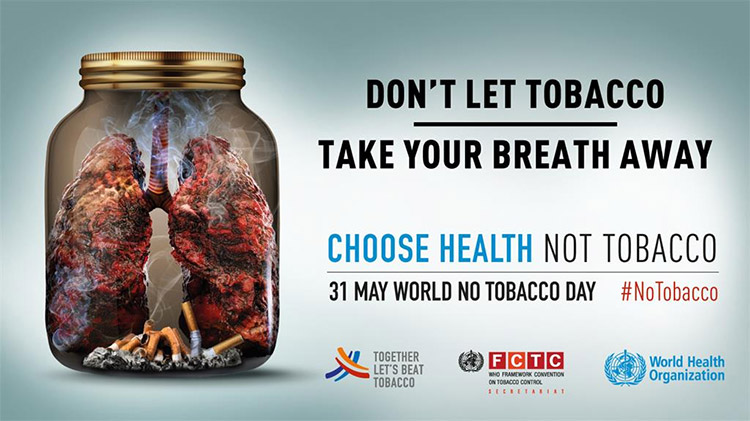
This year’s World No Tobacco Day 2019 campaign focuses on tobacco and lung health. Tobacco has a negative impact on people’s lung health, from cancer to chronic respiratory disease.
Tobacco smoking is the primary cause for lung cancer, responsible for over two thirds of lung cancer deaths globally. Second-hand smoke exposure at home or in the work place also increases risk of lung cancer. Additionally, tobacco smoking is the leading cause of chronic obstructive pulmonary disease (COPD), a condition where the build-up of pus-filled mucus in the lungs results in a painful cough and agonising breathing difficulties. The risk of developing COPD is particularly high among individuals who start smoking at a young age, as tobacco smoke significantly slows lung development. Tobacco also exacerbates asthma, which restricts activity and contributes to disability. Furthermore, tuberculosis damages the lungs and reduces lung function, which is further exacerbated by tobacco smoking – which is a very dangerous form of air pollution. Tobacco smoke contains over 7000 chemicals, 69 of which are known to cause cancer.
In the Eastern Mediterranean Region, tobacco use is alarming. Around 38% of men and 4% of women (21% of adults on average) are smokers. In some countries, as many as 52% of men and 22% of women smoke. Smoking among youth is particularly worrying, reaching 42% in boys and 31% in girls. This includes smoking shisha, which is more popular among youth than cigarettes. Smoking is expected to rise by 2025 in WHO’s Eastern Mediterranean Region, contrary to the trend for all other WHO regions. This will lead to an escalating epidemic of lung disease regionally.
Solutions to reduce related death and disease are available, such as advocating for effective policies to reduce tobacco consumption and engaging stakeholders across multiple sectors in the fight for tobacco control. Governments and partners can beat tobacco by implementing the WHO Framework Convention on Tobacco Control (WHO FCTC), and adopting the MPOWER measures to reduce demand for this deadly product. The comprehensive implementation of the WHO FCTC and the MPOWER measures to reduce tobacco use in the Region would lead to a reduction in tobacco use ranging from 20% to 40% in 5 years and, in some countries, by up to 36% in 5 years and 56% in 15 years.
On this World No Tobacco Day, governments and partners need to unite to beat tobacco, which kills over 7 million people every year, which translates into more than 19 000 people dying every day from tobacco use or second-hand smoke. Quitting smoking can reduce the risk of lung cancer, slows the progression of COPD and improves asthma symptoms. Start now!
Raise awareness on the harmful and deadly effects of tobacco use and second-hand smoke exposure.
Discourage the use of tobacco in any form.
Advocate for effective policies to reduce tobacco consumption.
WHO Framework Convention on Tobacco Control
MPOWER: technical package to defeat the global tobacco epidemic


